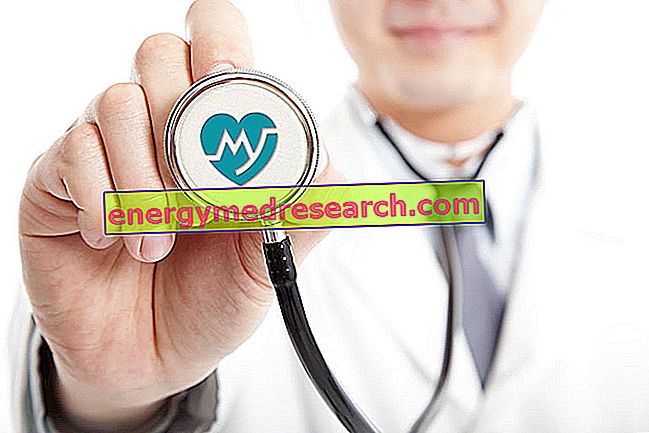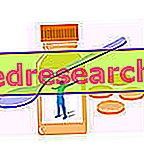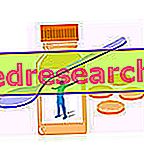Generality
Accelerated heart beats are a frequent but relatively non-specific manifestation. In most cases, these represent a benign symptom, ie they appear in the absence of heart disease or other underlying diseases. Occasionally, however, accelerated heartbeats can hide a life-threatening condition .

Accelerated heartbeats can be perceived as a feeling of heart-throb, heart-pounding, feeling of fainting or "diving" to the heart. For some patients, the increase in heart rate is unpleasant and alarming.
The key to diagnosis is an electrocardiogram ( ECG ), which allows the electrical impulses of the heart to be recorded and their conduction. Treatment is directed to the specific cause of accelerated beats.
What are
Accelerated heart beats can be understood primarily as:
- Palpitations or heart beat: it is the perception of one's heart beats that are felt on the precordium (part of the thorax anterior to the sternum), at the throat or at the neck. Palpitations can give the impression of an anomaly affecting the heart; however, this manifestation is often harmless and transitory.
- Tachycardia : it is an increase in pulse rate above 100 beats per minute, at rest or without any form of psychophysical stress. Tachycardia may be the expression of a functional disorder or severe cardiac electrical activity disorders.
Causes and Risk Factors
Accelerated beats may reflect changes in frequency (arrhythmias) or in heart rhythm (as in extrasystoles). However, this manifestation can be felt even in the absence of abnormal heart activity . Some people perceive an acceleration of the pulse due to stress, excitement, alcohol abuse, tobacco, excessive consumption of coffee, febrile illness or anxiety. Also the use of some drugs (such as adrenaline and ephedrine) and drugs (e. Amphetamines and cocaine) can produce the same effect. The accelerated beats can also be produced by cardiac and metabolic pathologies .
Physiological or Functional Accelerated Beats
If accelerated heartbeats are perceived by a healthy person who does not suffer from heart disease, there is usually no need to worry. It is, in fact, a benign manifestation, which does not entail health risks, especially if the episode is isolated or infrequent.
In these cases, heart beats do not depend on heart problems, but may be due to physiological or functional events, such as:
- Too intense physical effort : forces the heart to increase its activity, causing an increase in heart rate. The same effect is induced by a sedentary lifestyle, in which accelerated beats can be the consequence of every little effort.
- Strong emotional stress : the most intense activity of the sympathetic nervous system causes an increase in heart rate and adrenaline production, which is also responsible for accelerated heartbeats. Transient palpitations can also be associated with strong emotions, fear, anger and anxiety.
- Smoking habit : increases blood pressure and makes the heart beat faster, forcing it to do more work.
- Meals that are difficult to digest : the perception of accelerated beats may depend on the consumption of particularly "heavy" foods, which require many hours to be digested and attract a large amount of blood from the digestive system. This means that the heart must work more, increasing the frequency of beats. Speaking of dietary habits, even the intake of large quantities of alcoholic or caffeinated beverages (such as the consumption of more than 4 cups of coffee a day) can give rise to accelerated beats.
- Excessive heat: the humid and torrid climate induce a vasodilation, as a reaction of the increase of the body temperature; in practice, the body tries to divert more blood to the skin surface to help eliminate heat. However, among the effects of vasodilation there is a reduction in the arterial pressure that the nervous system tries to maintain stable also through the increase of the heart beats.
- Menopause : hormonal changes can cause vasodilation and an increase in heart rate.
- Decreased potassium : the accelerated beats can be the consequence of a lack of potassium, a fundamental mineral for heart health.
Pathological Accelerated Beats
Accelerated heartbeats can depend on causes directly related to the heart such as:
- High blood pressure (hypertension);
- Atherosclerosis;
- Hypertension;
- coronary heart disease;
- Myocardial infarction;
- Heart failure;
- Congenital heart disease (defects present at birth);
- Heart valve dysfunctions (valvulopathies);
- Cardiac arrhythmias and disorders of the conduction system;
- Cardiac muscle disorders (cardiomyopathies);
- Inflammatory or degenerative heart conditions (including infections and tumors);
- Chronic pneumopathies.
Non-cardiac disorders that can trigger or aggravate accelerated beats include:
- Pheochromocytoma (rare adrenal medullary tumor that causes hypermetabolism episodes);
- Thyroid dysfunction (hyperthyroidism, thyrotoxicosis etc.);
- Anemia (especially after physical exertion);
- Panic attack (acute anxiety);
- Hypocalcemia;
- Hypoglycemia.
Symptoms and Complications
The accelerated beats are perceived as an anomaly in the intensity and regularity of the heart's pulse. Palpitations can be regular or irregular, paroxysmal or sustained.
Accelerated beats in normal / physiological conditions
When they occur in healthy people and are not associated with other diseases, accelerated heartbeats usually do not cause particular symptoms, in addition to the perception of increased heart rate. Only in some cases is it possible to feel a sense of heat or sudden sweating.
In people who are not suffering from heart disease or other diseases, accelerated heartbeats are typically a transient and short-lived phenomenon.
Pathological Accelerated Beats
When they depend on heart disease or another illness, the rapid heartbeats appear more often and for prolonged periods. Furthermore, depending on the cause that caused the onset, they can be associated with other symptoms, such as:
- Dyspnea : when wheezing and air hunger are concomitant with accelerated heartbeats they can indicate the presence of a serious heart problem, such as a heart failure, that requires adequate medical attention.
- Sudden weakness : the feeling of tiredness that can accompany accelerated beats can be a symptom of anemia or hypertension.
- Dizziness and dizziness : if together with the accelerated beats, tremors, sudden sweats, dizziness and fainting are experienced, it is possible that a hypoglycemic crisis is taking place (that is, the blood sugar has lowered below the normal value).
- Chills : when accelerated heartbeats occur in conjunction with chills and cold, there may be a drop in blood pressure or an episode of hypoglycemia. The combination of these symptoms can anticipate fever.
- Nausea and vomiting : feeling of nausea and episodes of vomiting, associated with accelerated beats, can be caused by gastrointestinal diseases.
Diagnosis
When the accelerated beats occur in a recurrent way, it is advisable to consult your primary care physician or the cardiologist of reference, in order to research in depth the cause that triggers this symptom and establish the right therapy to limit the disorder.
Preliminary clinical evaluation - consisting of medical history and physical examination - aims to understand the conditions under which the complete symptomatology is investigated (by looking for associated symptoms such as weakness, asthenia and anginal pain). The doctor also collects information about the use of drugs and the presence of cardiovascular or pulmonary diseases that can lead to arrhythmias, hypertension or hypoglycemia. Auscultation allows us to highlight any puffs, crackles and other anomalous signs associated with accelerated beats.
The patient is then subjected to laboratory tests to measure the concentration of sugar in the blood (glycaemia), dose the levels of thyroid hormones and check for any electrolyte imbalances.
Based on the results of these analyzes, the doctor indicates the execution of diagnostic tests such as the electrocardiogram, monitoring according to Holter or specialized examinations useful for investigating diseases affecting the heart, whether or not associated with diagnostic imaging.
Treatment
The treatment of accelerated beats, when necessary, is established by the general practitioner and by the reference cardiologist, based on the specific causes.
The accelerated beats that are associated with epigastric pain (in the upper part of the stomach) or chest, which radiates to the left arm and shoulder, feeling of dizziness and nausea, could be the symptom of a myocardial infarction, therefore it is necessary to go immediately to the emergency room.
Accelerated non-pathological beats
If the person is healthy, the non-pathological accelerated beats need not necessarily be treated. When the phenomenon is infrequent and does not depend on a pathology, there is no reason to worry. In some cases, if the accelerated beats are very unpleasant or interfere with the performance of normal daily activities, antiarrhythmic drugs may be prescribed (eg flecainide, propafenone, sotalol and amiodarone). These medicines regularize the heartbeat, but should be taken carefully following the doctor's instructions.
In case of pathologies
The treatment of accelerated beats is directed to the cause underlying the origin of this problem, taking into account the general condition of the patient.
If the phenomenon is related to fever, for example, the doctor may indicate the intake of an antipyretic; when accelerated beats are caused by hypertension, drugs may be prescribed to regularize blood pressure and so on.
With regards to heart disease, it is not always easy to establish the cure of accelerated heartbeats. The use of antiarrhythmic drugs must take into account the side effects that may occur in the presence of heart disease. Therefore, specialists tend to prescribe therapies that can control the overall health of the heart. These medicines include beta-blockers and statins. The first category of drugs is able to reduce the excitability, frequency and force of contraction of the heart, regulating heart rate and oxygen consumption. Beta-blockers are used for the treatment of hypertension, but are also useful in heart attacks, angina pectoris and heart failure.
Instead, statins reduce the levels of bad cholesterol in the blood, thus also protecting the heart.
To remember
Accelerated heartbeats can indicate a myocardial infarction or a state of shock, which requires immediate medical intervention . Usually, however, these events are associated with other alarm signals, such as: pain or tightness in the chest, pallor of the face, tingling in the hands, vomiting, difficulty breathing and loss of consciousness. It is important, therefore, that when accelerated heartbeats are felt, pay attention to the other concomitant symptoms and go, if necessary, to the emergency room.



